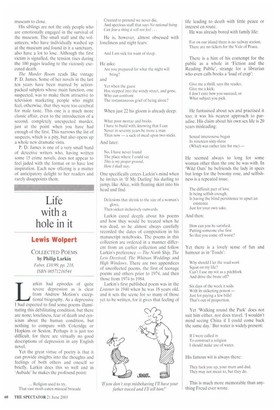Life with a hole in it
Lewis Wolpert
COLLECTED POEMS by Philip Larkin Faber, £10.99, pp. 218, ISBN 00571216544 Larkin had episodes of quite severe depression as is clear from Andrew Motion's exceptional biography. As a depressive I had expected to find some poems illuminating this debilitating condition, but there are none; loneliness, fear of death and cynicism about the human condition, but nothing to compare with Coleridge or Hopkins or Sexton. Perhaps it is just too difficult, for there are virtually no good descriptions of depression in any English novel.
Yet the great virtue of poetry is that it can provide insights into the thoughts and feelings of both others and oneself so briefly. Larkin does this so well and in `Aubade' he makes the profound point:
Religion used to try.
That vast moth-eaten musical brocade Created to pretend we never die, And specious stuff that says No rational being Can fear a thing it will not feel.
He He is, however, almost obsessed with loneliness and night fears:
And I am sick for want of steep.
He asks: Are you prepared for what the night will bring?
and
Yet when the guest Has stepped into the windy street, and gone, Who can confront The instantaneous grief of being alone?
When just 22 his gloom is already deep:
What poor mortar and bricks I have to build with, knowing that I can Never in seventy years be more a man Than now — a sack of meal upon two sticks.
And later:
No, I have never found The place where I could say This is my proper ground, Here shall stay;
One specifically enters Larkin's mind when he invites in 'If My Darling' his darling to jump, like Alice, with floating skirt into his head and find
Delusions that shrink to the size of a woman's glove, Then sicken inclusively outwards.
Larkin cared deeply about his poems and how they would be treated when he was dead, so he almost always carefully recorded the dates of composition in his manuscript notebooks. The poems in this collection are ordered in a manner different from an earlier collection and follow Larkin's preference — The North Ship, The Less Deceived, The Whitsun Weddings and High Windows. There are two appendices of uncollected poems, the first of teenage poems and others prior to 1974, and then those from 1974 to 1984.
Larkin's first published poem was in the Listener in 1940 when he was 18 years old, and it sets the scene for so many of those yet to be written, for it gives that feeling of life leading to death with little peace or interest en route.
He was already bored with family life:
For on our island there is no railway station, There are no tickets for the Vale of Peace.
There is a hint of his contempt for the public as a whole in 'Fiction and the Reading Public', strange for a librarian who even calls books a 'load of crap':
Give me a thrill. says the reader, Give mc a kick; I don't care how you succeed, or What subject you pick.
He fantasised about sex and practised it too; it was his nearest approach to paradise. His claim about his own sex life is 20 years misleading:
Sexual intercourse began In nineteen sixty-three (Which was rather late for me) —
He seemed always to long for some woman other than the one he was with. In 'Wild Oats' he befriends the lady in specs but longs for the bosomy rose, and selfishness is a repeated issue.
The difficult part of love Is being selfish enough, Is having the blind persistence to upset an existence Just for your own sake.
And then:
How can you be satisfied, Putting someone else first So that you come off worst?
Yet there is a lovely sense of fun and humour as in 'Toads':
Why should I let the toad work Squat on my life?
Can't I use my wit as a pitchfork And drive the brute off?
Six days of the week it soils With its sickening poison — Just for paying a few bills! That's out of proportion.
Yet 'Walking round the Park' does not suit him either, nor does travel. 'I wouldn't mind seeing China if I could come back the same day.' But water is widely present:
If I were called in To construct a religion I should make use of water.
His famous wit is always there:
They fuck you up, your mum and dad. They may not mean to, hut they do.
This is much more memorable than anything Freud ever wrote.


































































































 Previous page
Previous page